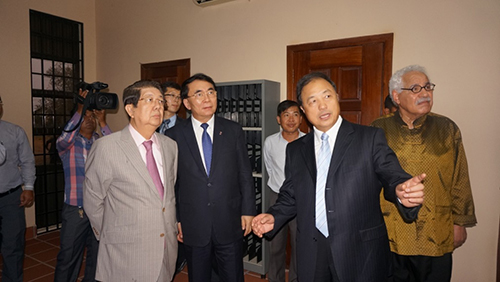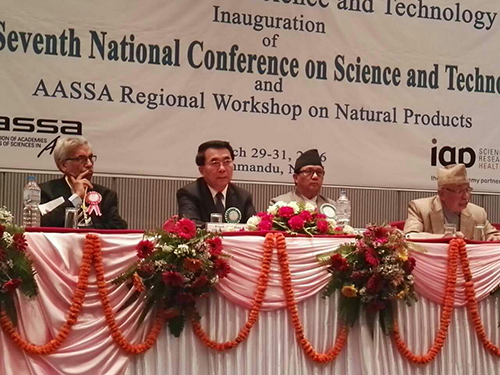

At the invitation of Cambodia’s National Authority for the Protection and Management of Angkor and the Region of Siem Reap (APSARA) and the Nepal Academy of Science and Technology (NAST), Chinese Academy of Sciences (CAS) President Bai Chunli led a delegation to Cambodia and Nepal from March 22 to 29 to further promote cooperation between CAS and the two countries’ research institutes, universities and relevant government bodies.
During his visit to Siem Reap, Cambodia, Bai and Cambodian Deputy Prime Minister Sok An held talks at the APSARA headquarters. They then inspected the “Remote Sensing for Environment of Angkor Site” (REAS) work station of UNESCO’s International Centre on Space Technologies for Natural and Cultural Heritage (HIST), which was built by CAS’s Institute of Remote Sensing and Digital Earth (RADI) .
Sok An spoke highly of HIST’s work in Cambodia. He said the cooperation has generated good effects, and that he hopes the HIST and the APSARA can carry out second phase cooperation following the first phase (2013-2016) and expand cooperation from Angkor to the Preah Vihear temple and other World Heritage sites in Cambodia.
CAS’s Research Center for Eco-environmental Sciences and the Ministry of Industry and Handicraft (MIH)of Cambodia signed a memorandum of understanding, and the two sides agreed to deepen cooperation in building a joint laboratory and training professionals in water quality monitoring.

CAS president bai Chunli and Cambodian Deputy prime Minister Sok An inspect the “Remote Sensing for environment of Angkor Site” project.
In Nepal, Bai and NAST Vice-Chancellor Jiba Raj Pokharel signed a memorandum of understanding on behalf of the two academies and attended the 7th National Conference on Science and Technology of Nepal. Bai delivered a keynote speech at the meeting, introducing China’s experience in pursuing sustainable development through scientific and technological innovations, which attracted an audience of more than 650 scientists from 17 countries.

CAS president bai Chunli delivers a keynote speech at the 7th National Conference on Science and Technology of Nepal.
During his stay in Nepal, Bai also paid a visit to Tribhuvan University. He and the university’s Vice-Chancellor Tirtha Raj Khaniya unveiled the Kathmandu Center for Research and Education on the university’s campus and met with the first group of Nepali students enrolled in a CAS master’s program through the center. Bai invited the students to study in China and encouraged them to take the opportunity to grow into Nepal’s core talents.
SOURCE: CAS.CN